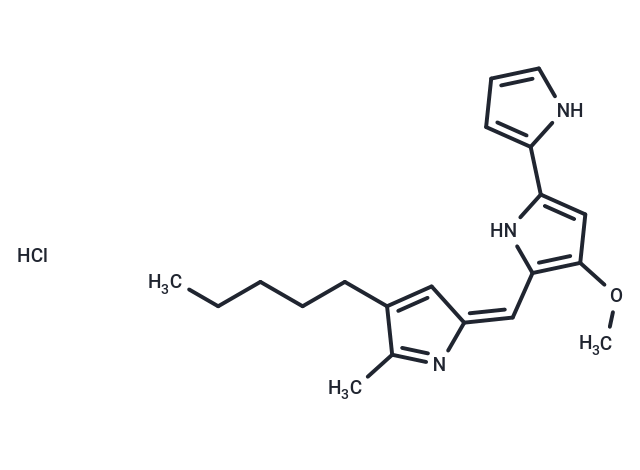Shopping Cart
- Remove All
 Your shopping cart is currently empty
Your shopping cart is currently empty

Prodigiosin hydrochloride, a red pigment, is a bioactive secondary metabolite produced by bacteria. It exhibits potent proapoptotic activity and functions as an inhibitor of the Wnt/β-catenin pathway. Additionally, this compound possesses antibacterial, antifungal, antiprotozoal, antimalarial, immunosuppressive, and anticancer properties.

| Pack Size | Price | Availability | Quantity |
|---|---|---|---|
| 25 mg | $6,329 | Backorder |
| Description | Prodigiosin hydrochloride, a red pigment, is a bioactive secondary metabolite produced by bacteria. It exhibits potent proapoptotic activity and functions as an inhibitor of the Wnt/β-catenin pathway. Additionally, this compound possesses antibacterial, antifungal, antiprotozoal, antimalarial, immunosuppressive, and anticancer properties. |
| In vitro | Treatment with Prodigiosin (25-500 nM) for 24 hours significantly reduces the viability and proliferation of breast cancer cells, specifically demonstrating IC50 values of 62.52 nM in MDA-MB-231 cells and 261.2 nM in MDA-MB-468 cells after 48 hours. Furthermore, this treatment markedly diminishes the levels of crucial components in the Wnt signaling pathway, namely phosphorylated LRP6, DVL2, active and total β-catenin in cell line studies, while also enhancing GSK3β activity through reduced phosphorylation at Ser9 in HEK293T cells. These effects suggest a potent inhibition of cell proliferation and induction of apoptosis in breast cancer cells, as well as a dose-dependent blockage of Wnt signaling stimulated by various Wnt factors in transfected HEK293T cells. Additionally, Prodigiosin exhibits significant antifungal activity against chytrid fungi, Batrachochytrium dendrobatidis, and B. salamandrivorans, with MIC values of 10 μM and 50 μM, respectively. These findings underscore Prodigiosin's broad biological activity, including its ability to inhibit Wnt signaling and its potential therapeutic applications in cancer and fungal infections. |
| In vivo | Prodigiosin (5 mg/kg; intraperitoneal injection; twice weekly; for 3 weeks) significantly inhibits tumor growth by reducing tumor cell density and decreasing Ki-67 expression in female BALB/c nude mice injected with MDA-MB-231 cells[1], resulting in marked tumor growth inhibition. |
| Alias | Prodigiosine hydrochloride |
| Molecular Weight | 359.9 |
| Formula | C20H26ClN3O |
| Cas No. | 56144-17-3 |
| Relative Density. | no data available |
| Storage | Powder: -20°C for 3 years | In solvent: -80°C for 1 year | Shipping with blue ice. |

Copyright © 2015-2025 TargetMol Chemicals Inc. All Rights Reserved.